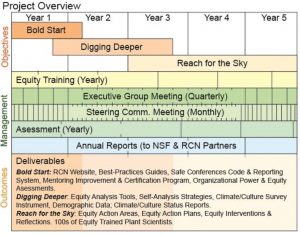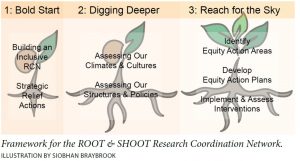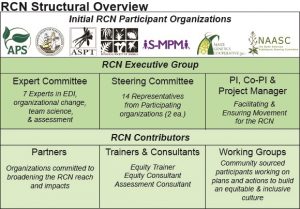We are excited to announce that a group of seven plant science organizations have been awarded a five-year grant through the NSF’s LEAPS [LEAding cultural change through Professional Societies (LEAPS) of Biology] program. The goal of an NSF LEAPS RCN is to catalyze cultural change and as such, we aim to include more partners as the project progresses and we openly share our ongoing work and all the resources we develop.
This Research Coordination Network (RCN) is now comprised of six plant science organizations:
- American Society of Plant Biologists (ASPB)
- American Society of Plant Taxonomists (ASPT)
- Botanical Society of America (BSA)
- International Society for Molecular Plant Microbe Interactions (IS-MPMI)
- Maize Genetics Cooperation (MGC)
- North American Arabidopsis Steering Committee (NAASC)
As well as other organizations that serve marginalized scientists:
- Society for the Advancement of Chicano/Hispanics and Native Americans in Science (SACNAS)
- Minorities in Agriculture, Natural Resources, and Related Sciences (MANRRS)
- Out in STEM (oSTEM)
- Howard Hughes Medical Institute (HHMI)
- Corteva Agriscience
- Bayer Crop Science
This project will provide resources, trainings, opportunities, and structures aimed at seeding and cultivating change towards an inclusive, equitable, and scientific future for our discipline.
Background
The ROOT & SHOOT program was collaboratively designed to accomplish three major aims: first, to immediately address known key systemic barriers to full participation within each organization; second, to require the partner organizations to dig deeply into themselves and build more equitable and inclusive structures; and third, to allow the plant science community to identify bold new directions that will continue expanding participation and provide a system of coordination of the required labor and sharing of ideas, practices, and outcomes (community-based working groups).

As part of Phase 1, a Bold Start, the RCN is focused on establishing an inclusive, equitable, and anti-racist operation path; and immediately addressing key known climate and cultural deficiencies.
As part of Phase 2, Digging Deeper, the RCN will assess our organizational climate and culture; assess our organizational structures through an anti-racist, equity lens; and implement self-assessments within each RNC participant organization.
In Phase 3, Reach for the Sky, the RCN will identify areas for Equity Action; and develop and assess Equity Action Plans.

RCN Structure
The Steering Committee is comprised of twelve representatives – two representatives from each of the six participating organizations. Each committee and group within the RCN operates under the principles of democratic consensus as representatives of our communities. Decisions are reached through consensus building; all members have equitable standing with ‘chairs’ replaced by rotating facilitation sharing. We follow collaborative and collective work processes where each member engages when and how they are able. Adopting a democratic and non-hierarchical process is ensures that the RCN itself reflects our collective vision of equity and inclusion. This method of operation will also serve to train hundreds of plant scientists in equitable practices and facilitation, demonstrating a different way of working that promotes true equity and inclusion.
The Experts Committee provides guidance to ensure that the work of the RCN is meaningful, consistent with evidence, and developed by and for the marginalized scientists it aims to support. The Experts Committee (EC) is composed of individuals with expertise and experience in EDI, structural organizational change, and team science; the EC will have 7-10 members and be intentionally diverse in terms of race, ethnicity, gender, disability, sexual orientation, career stage, scientific discipline, and institution type. Service roles are disproportionately heavy for diverse individuals with little to no compensation; as such, each EC member receive an annual stipend and have agency over the length of their service term.

Intellectual Merit
This RCN coordinates the development and dissemination of resources for building and sustaining equitable and inclusive scientific organizations. It will provide broad training of the plant science communities in equitable practices and operations. Hundreds of scholars and practitioners will be trained in topics such as inclusive teamwork, climate and cultures assessment, and culturally responsive mentoring. The network will create shared web pages, guides, workshops, webinars, and action plans to educate and inform our community members and others who can learn from our journey.
Broader Impacts
A critical and long-lasting impact of the RCN will be the establishment of interactions among plant science organizations, industry partners, and organizations focused on broadening participation. The network will create working groups and cohorts through which diverse groups can work and learn together, providing additional cross-pollination opportunities across the plant sciences and spaces with a focus on serving marginalized populations. These groups will include early- career scientists, participants from minority serving institutions, and industry scientists. Long-term, the outcomes of the RCN will ensure that our spaces are committed to inclusion and that all can thrive.
—
Questions? Contact Marcia Puig-Lluch, Program Facilitator, at marcia@rootandshoot.org.